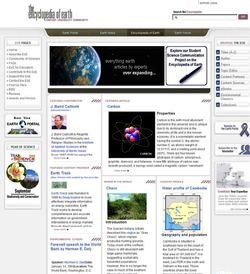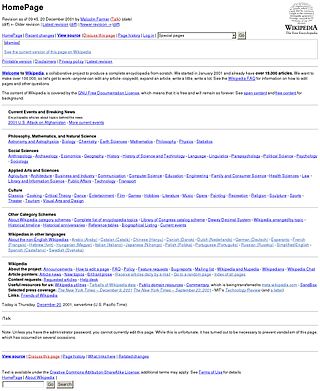
Wikipedia, a free-content online encyclopedia written and maintained by a community of volunteers known as Wikipedians, began with its first edit on 15 January 2001, two days after the domain was registered. It grew out of Nupedia, a more structured free encyclopedia, as a way to allow easier and faster drafting of articles and translations.
Digital Universe was a free online information service founded in 2006. The project aimed to create a "network of portals designed to provide high-quality information and services to the public". Subject matter experts were to have been responsible for reviewing and approving content; contributors were to have been both experts and the public.
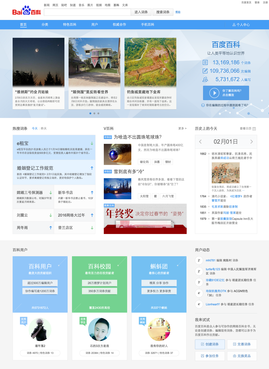
Baidu Baike is a semi-regulated Chinese-language collaborative online encyclopedia owned by the Chinese technology company Baidu. The beta version was launched on April 20, 2006, and the official version was launched on April 21, 2008, edited by registered users. As of February 2022, it has 25.54 million entries and more than 7.5 million editors. It has the largest number of entries in the world of any Chinese-language online encyclopedia.
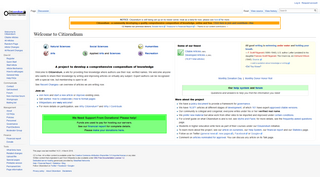
Citizendium is an English-language wiki-based free online encyclopedia launched by Larry Sanger, co-founder of Nupedia and Wikipedia.

Scholarpedia is an English-language wiki-based online encyclopedia with features commonly associated with open-access online academic journals, which aims to have quality content in science and medicine.

Conservapedia is an English-language, wiki-based, online encyclopedia written from a self-described American conservative and fundamentalist Christian point of view. The website was established in 2006 by American homeschool teacher and attorney Andrew Schlafly, son of the conservative activist Phyllis Schlafly, to counter what he perceived as a liberal bias in Wikipedia. It uses editorials and a wiki-based system for content generation.

Wikivoyage is a free web-based travel guide for travel destinations and travel topics written by volunteer authors. It is a sister project of Wikipedia and supported and hosted by the same non-profit Wikimedia Foundation (WMF). Wikivoyage has been called the "Wikipedia of travel guides".

The Marsabit clawed frog is a species of frog in the family Pipidae found in Kenya, Tanzania, and possibly Uganda. Its natural habitats are subtropical or tropical high-altitude grassland, rivers, freshwater lakes, intermittent freshwater lakes, freshwater marshes, intermittent freshwater marshes, pastureland, and ponds.

WikiPilipinas is an online, free content website which bills itself as a combination "non-academic encyclopedia", web portal, directory and almanac for Philippine-based knowledge. Like Wikipedia, it contains various articles on Philippine-related topics. Unlike Wikipedia, many of the articles cover topics that would otherwise be deemed unencyclopedic by the stricter Wikipedia. The service for example, promotes the concept of original research and eschews the larger encyclopedia's neutral point-of-view principle.

Veropedia was a free, advertising-supported online encyclopedia launched in late October 2007. It was taken down in January 2009, pending creation of a new version.

The GNU Free Documentation License is a copyleft license for free documentation, designed by the Free Software Foundation (FSF) for the GNU Project. It is similar to the GNU General Public License, giving readers the rights to copy, redistribute, and modify a work and requires all copies and derivatives to be available under the same license. Copies may also be sold commercially, but, if produced in larger quantities, the original document or source code must be made available to the work's recipient.
Wikipedia has been studied extensively. Between 2001 and 2010, researchers published at least 1,746 peer-reviewed articles about the online encyclopedia. Such studies are greatly facilitated by the fact that Wikipedia's database can be downloaded without help from the site owner.

Lawrence Mark Sanger is an American Internet project developer and philosopher who was the editor-in-chief of the online encyclopedia Nupedia and co-founded its successor Wikipedia along with Jimmy Wales. Sanger coined the name 'Wikipedia', and wrote many of Wikipedia's early guidelines, including the "Neutral point of view" and "Ignore all rules" policies. Sanger later worked on other encyclopedic projects, including Encyclopedia of Earth, Citizendium, and Everipedia, and advised the nonprofit American political encyclopedia Ballotpedia.
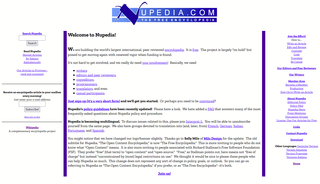
Nupedia was an English-language online encyclopedia whose articles were written by volunteer contributors with appropriate subject matter expertise, reviewed by expert editors before publication, and licensed as free content. It was founded by Jimmy Wales and underwritten by Bomis, with Larry Sanger as editor-in-chief. Nupedia operated from October 1999 until September 2003. It is best known today as the predecessor of Wikipedia. Nupedia had a seven-step approval process to control content of articles before being posted, rather than live wiki-based updating. Nupedia was designed by a committee of experts who predefined the rules. It had only 21 articles in its first year, compared with Wikipedia having 200 articles in the first month, and 18,000 in the first year.

The Definition of Free Cultural Works evaluates and recommends compatible free content licenses.
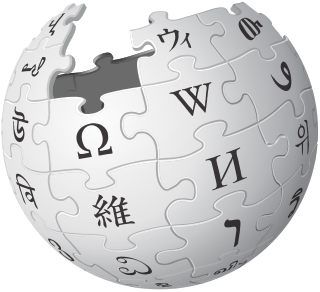
The following outline is provided as an overview of and a topical guide to Wikipedia:
A WikiProject, or Wikiproject, is an affinity group for contributors with shared goals within the Wikimedia movement. WikiProjects are prevalent within the largest wiki, Wikipedia, and exist to varying degrees within sibling projects such as Wiktionary, Wikiquote, Wikidata, and Wikisource. They also exist in different languages, and translation of articles is a form of their collaboration.
Perceived ideological bias on Wikipedia, especially on its English-language edition, has been the subject of academic analysis and public criticism of the project. Questions relate to whether its content is biased due to the political, religious, or other ideologies its volunteer editors may adhere to. These all draw concerns as to the possible effects this may have on the encyclopedia's reliability.

Appropedia is a wiki-based website that contains content relating to poverty, environmental degradation and international development.
